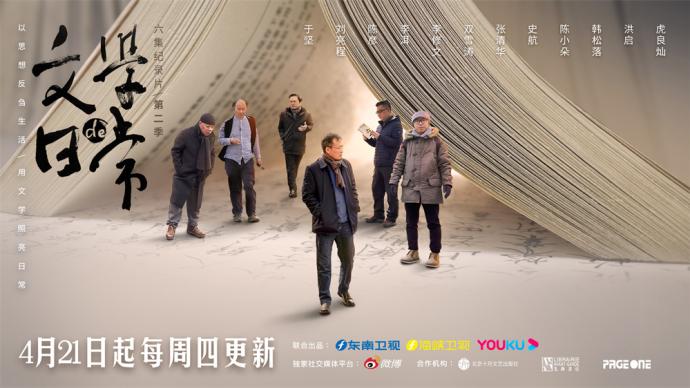
On April 21, on the eve of World Book Day, the second season of the humanities documentary "Literature Everyday" was launched on Southeast TV, Straits TV and Youku Video. The first season of this documentary was broadcast two years ago. It cuts in from the perspective of "visiting friends" and leads the audience to five writers: Ma Yuan, Ma Jiahui, Mai Jia, Alai, and Xiaobai. So far, the Douban score is 8 points. . This year, the new season of "Literature Everyday" will feature six writers and their friends, namely Liu Liangcheng and Hong Qi, Yu Jian and Hu Liangcan, Li Xiuwen and Han Songluo, Shuang Xuetao and Shi Hang, and Li Er and Zhang Qinghua, Chen Yan and Chen Xiaoduo.
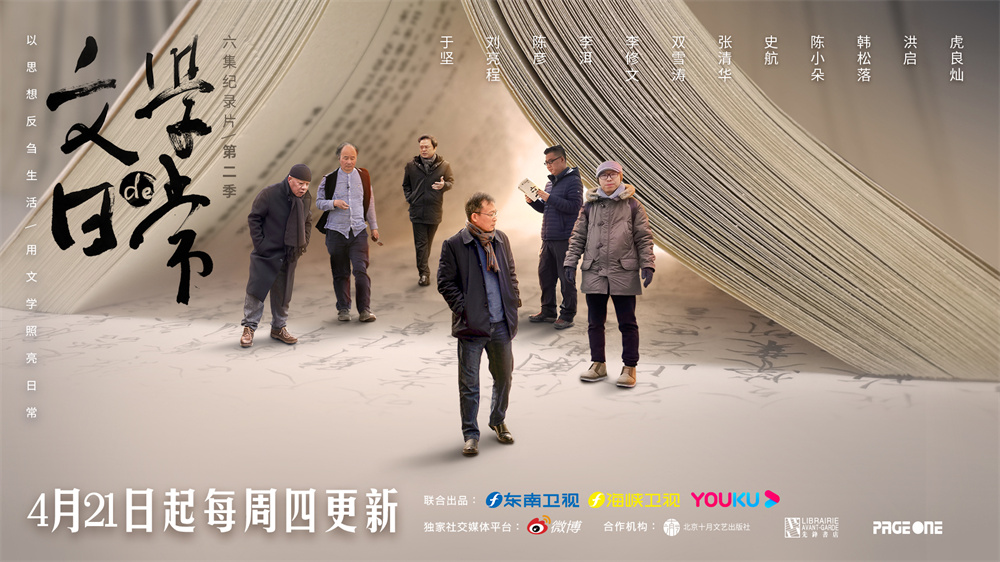

The flashy and poetic existence can impress many people
The Paper : How did you come up with the idea of making the series "Daily Life of Literature"?
Wang Shengzhi : The second season of "Daily Life of Literature" has already been filmed. The filming of the first season was in 2019. At that time, I wanted to shoot this series because of my personal interests. I was born in the Chinese department, and my postgraduate studies are also modern and contemporary literature. After work, I also spend most of my leisure time reading novels. Once at a dinner party in Shanghai, Ma Jiahui told me that the relationship between writers and works is a bit like the relationship between a hen and an egg. If you feel good eating this egg, you may want to meet this hen. I think this is indeed the case. There should be a mutual mapping relationship between the work and the author himself.
I have always been interested in the group of writers, but I know that this era does not belong to writers. This era is the era of intelligence, or the era of 5G, the era of traffic, but not the era of writers. My original expectation was that no one would watch it after the filming, but then I also told myself that maybe this is also the best era for writers, because writers don’t need too much attention.
On the other hand, the group of writers has a characteristic. They are people whose main life is thinking. They soothe people through words. Other information communication, such as we brush a lot of Douyin every day, brush a lot of today's headlines, to put it bluntly, it is pushed to you by big data, it is not really communication, but people do need to communicate. So I think this group is still relevant in this day and age. So I moved to shoot a group of contemporary writers.
The Paper : Was the title "Daily Life of Literature" set from the beginning? The related name may be "writer's daily life", but the meaning is completely different, so I am also curious what ideas the name "literary daily life" carries?
Wang Shengzhi : Yes, thank you for asking this question. So many reporters have asked this question. We could easily call it "the daily life of the writer", or "the daily life of the writer", but such a name would be banal. Our daily life is originally attached to the ground, day after day. Then why add an attribute - "literary" before the daily? Because literature means the ability to dream, and it means that even if you stick to the ground, literature can lift you up from the dust and have the ability to fly a little bit. In this film, I never give the writer a biography, and I never use a long commentary to introduce what he has written and what honors he has won. I don't care about literature, not writers. I want to shoot The literary qualities in them are also called dream qualities.
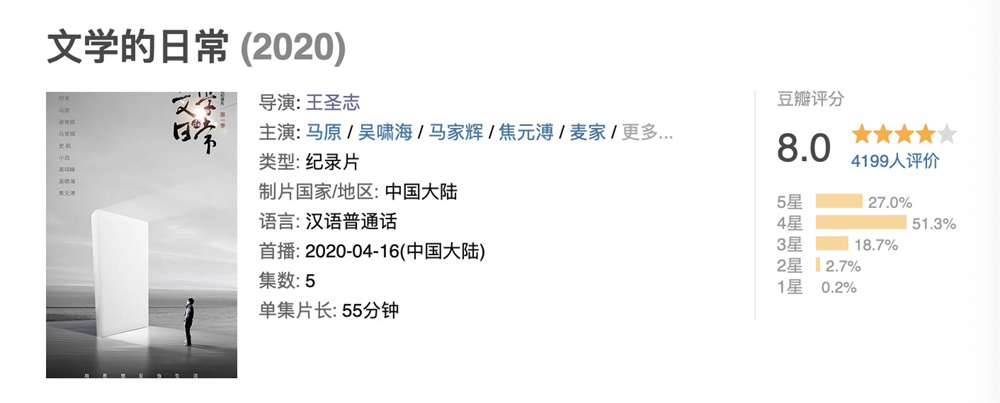
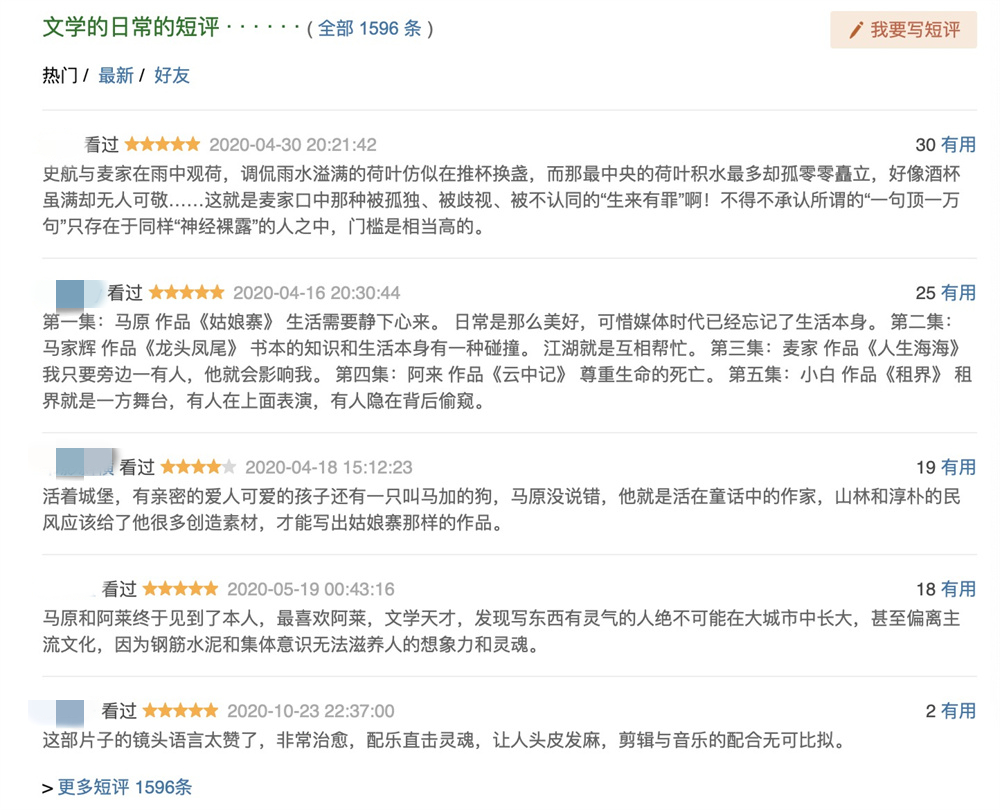
Wang Shengzhi : My standard is not in the Federation of Literary and Art Circles, not in literary awards, not in film and television adaptation, nor in whether it has its own traffic. In the past two seasons, my choices were entirely based on my own reading interests. The writers I choose are the ones I've seen major works over the years and who have inspired me to read and think. So after the first season came out, I watched the barrage and comments, and there were many viewers who said that he liked whoever and whoever, and whoever who was not familiar before but has become a fan since then. Human resonance. It can also be seen that some writers are not personal, and his works and ideas can touch many people.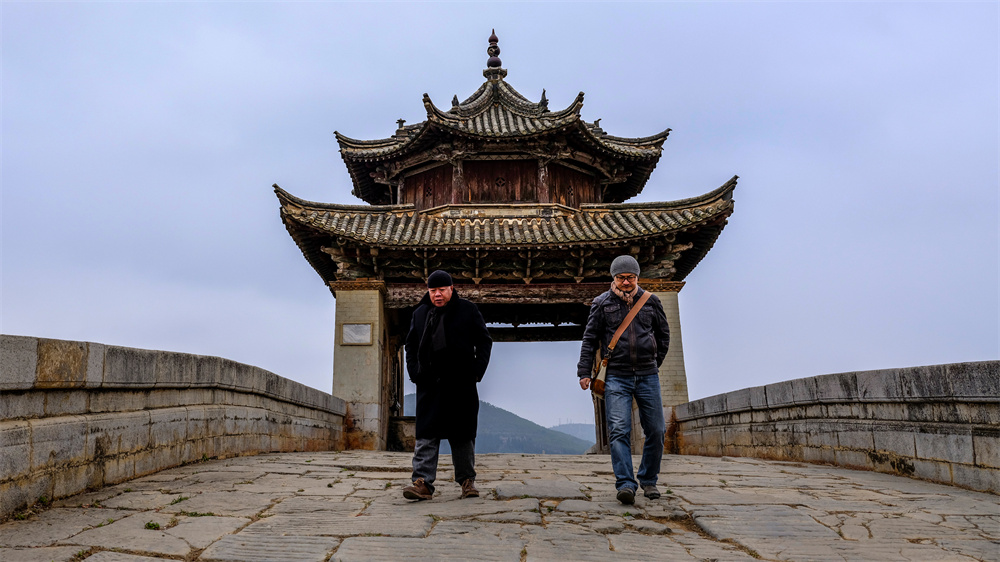
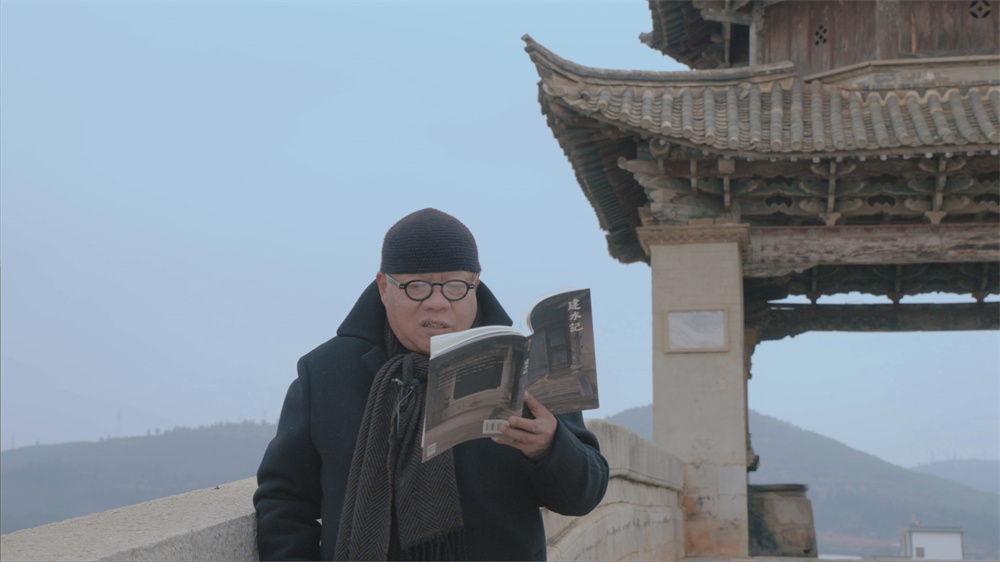
Wang Shengzhi : You know, the "meetings" between writers and reporters and directors are not friendly, and I have a lot of closed doors. Why is this so? Because most writers are very active, adventurous and exploratory in the spiritual world, but in the real world, he may be clumsy, shy, timid, and at a loss when facing the camera. So when encountering the media, the first reaction of many writers is to refuse.
But I am very confident that the writers under my camera are at ease, and no matter who they are, they will definitely be able to speak with their hearts and hearts. At first, Mr. Liu Liangcheng was worried that I would break his filming. He strongly demanded to see the demo before the broadcast, so I sent him the demo. He didn't respond that night, and I didn't ask. The next day, he told me to watch it again at noon. He also said that he never thought that the director of a Chinese TV station could make it like this. He said that this film is much more meaningful than many documentaries of foreign writers he has seen. Also, he said that the whole filming process was very enjoyable, and he didn't feel like he was "being interviewed." So to approach the writer, you must first become the writer's bosom friend, and even try to become the writer's colleague, so that he is not embarrassed and willing to open his heart.
Of course, it is impossible to be their peers. Each of them has been thinking and writing for many years. How could I become a writer just because I made a documentary? So let me tell you frankly, every time I shoot a writer, I feel relieved, because I did a lot of "stupid work" before the interview, and my mind was full of their works and related comments. Their reserves are all used up. But also because of these "stupid kung fu", I was able to chat about their works freely in those two days, as if I were an acquaintance. Yes, in fact, I have turned them into acquaintances in my heart, but their actions in the real camera are unfamiliar. This familiar and unfamiliar feeling inspired my questions and their answers.

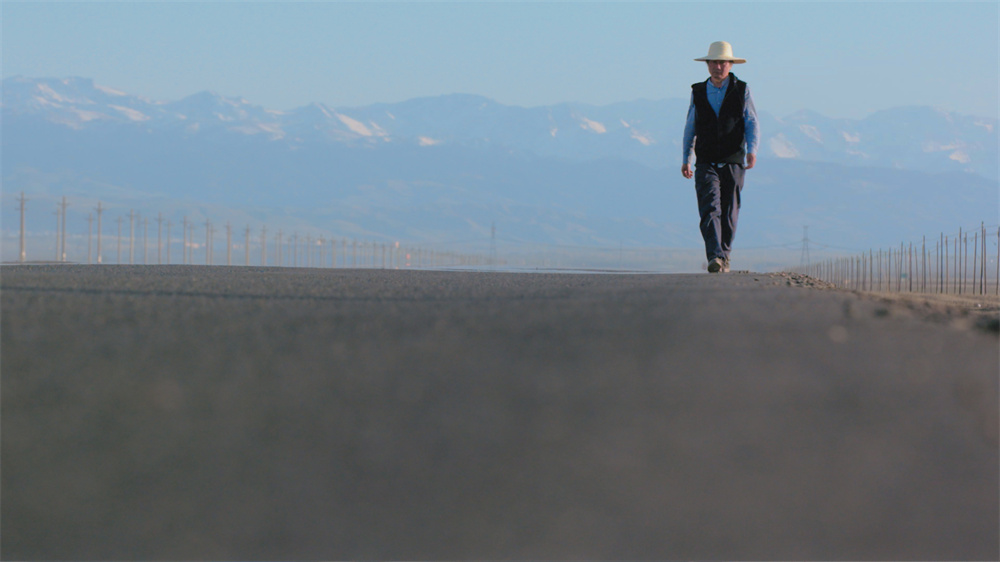
The Paper : In terms of the specific shooting method, how did you come up with the entry point of "visiting friends"? Their conversations sometimes consist of two people sitting down and talking, which we are relatively familiar with, but there are also many times two people talking while walking and talking on the move.
Wang Shengzhi : The two core elements of this film are here, one is "friends" and the other is "roaming". I wrote a sentence for them in the promotional video, saying, "The loneliest people often have the most persistent friends." The daily life of most writers is daze, thinking, and reading. They are often a person who walks alone in the spiritual back garden, but such people often have very persistent friends. As long as you find the right friends, they can mirror each other. Congruent sound. For example, many poems written by Wang Wei are for Pei Di. When a writer encounters a bosom friend and a real friend, he will talk endlessly. If you swap this friend for a TV host, chances are you'll end up being silent.
You pointed out another very important thing, which is roaming. Most writers were afraid of trouble at first, and they said that they should either shoot at home or in the study, but I was very insistent on this point, and I said to go out. This kind of roaming is particularly obvious in the second season. For example, Li Xiuwen and Han Songluo drove all the way from Lanzhou to Dunhuang. What is the core of this roaming? is an encounter. As long as you go out, you will encounter unexpected encounters, which is completely beyond the part of the so-called "planning case". After arriving in Dunhuang, we went to a village and met an uncle who was planting an elm tree at the entrance of the village. They asked the uncle what the elm money was used for, and then entered the uncle's yard smoothly. The uncle also greeted them to sit down and drink tea and told them about his past. Li Xiuwen later read a paragraph in "Mountains and Rivers Cassette" in that place: "In an instant, I felt inexplicable, and I had to thank you again for writing, Gratitude and writing will definitely run through my life, just because the rice waves in front of me and the hard work in the rice waves are exactly the two gods I want to worship for the rest of my life: the people and the beauty."
I want to say that this encounter is really unplanned, because roaming is both a movement of physical space and a spiritual journey of friends. They would talk deeper and deeper, with a lot of impromptu popping up. Encounters and improvisations are very real things, which are the core of my film, and what makes it different from "Hometown of Literature", "They Write on the Island", "The Moon in Hand", my film It's all about encounter and improvisation.
I remember when I was filming A Lai last season, one of his requirements was "I don't act." He said that many people asked him to make a film and asked him to act, from left to right, shaking hands and hugging whoever. He said that if he wanted to act, he wouldn't do it. My films seek extreme realism in wandering. But this is really unfriendly to the director, because you don't know when an encounter will appear, you have to catch it in time, zoom in on it, and go deep into it, and you can't do it again. In that scene, if you're blind, it's gone in a blink of an eye.
The Paper : There seems to be a geospatial issue here - where does the writer choose to live? Where does he go every day? Where does he want to take his friends? ... A writer's understanding of life, of literature, is often inseparable from these geographic spaces.
Wang Shengzhi : Yes, a writer's creation usually has a lot to do with his choice of place. Think about Bai Juyi or Su Dongpo. They built a house every time they went to a place they liked, planted flowers in the front and back, and then wandered in their spiritual world. If there was no such geographical or material base, how could there be a spiritual base? The base of one's creation is first and foremost in the sense of geospatial.

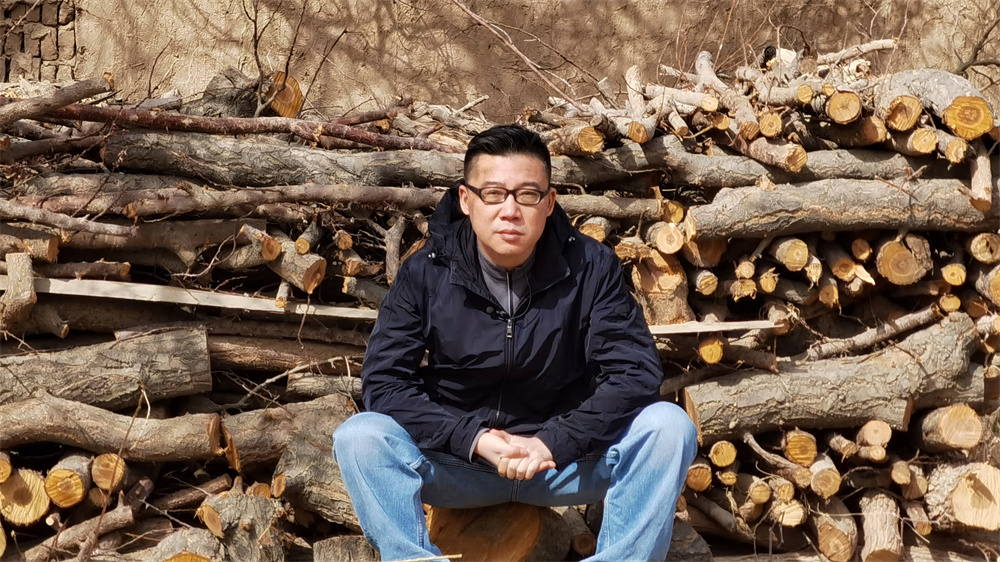
Wang Shengzhi : Every writer is a different individual, but I would like to talk to you about one thing they have in common, that is, they look mature and mature on the surface, but they are very naive and childish in their hearts, and they are full of curiosity about the world. Children who grew up in our rural areas say that the elderly live as "old children".
The Paper : As far as you are concerned, what are the unforgettable scenes during the shooting?
Wang Shengzhi : I remember Mr. Liu Liangcheng would squat down to talk to the lizards, and guess from the broken wine bottle that a herdsman’s night was howling with the west wind; Mr. Yu Jian was more like a child, he walked into an ancient courtyard and called me to go He looked at a door with a broken corner, and asked me if I knew how the corner came from. I said no, and he said seriously that the house belonged to the Song Dynasty. The husband and his wife quarreled, and the wife slammed the door and left. , the door broke in a corner. I was dumbfounded and thought, isn't this what a child said? And last season's Mr. Mai Jia, it was raining that day, he was not upset at all, he told me that if there was no rain, no moonlight, there would be no poet, and he also said: "If it doesn't rain, I can't fall in love, the sun keeps coming out. What about love?" It's very interesting, and I think it's wonderful to be able to record the innocence of these writers with video.
Besides Shuang Xuetao, the youngest writer in two seasons. At that time, when he and Shi Hang were walking in the alley, they entered a family. This family did not reject the camera, so we asked for a cup of tea. Unexpectedly, this family was laid off in the 1990s. He told Shuang Xuetao that I was a laid-off worker with no skills, unlike you as a writer. Shuang Xuetao immediately said seriously, my parents are all laid off. I was quite shocked at that moment. Then I asked him which book or which writer had the most influence before he became a writer, do you know what he said to me? He said his literary career began with The Reader.
Teacher Chen Yan returned to the home where he wrote a prototype in his first novel, The Story of Xijing. That person lives in an urban village in Xi'an. The bedroom is connected to the kitchen, and the total area is less than ten square meters. As a result, after Mr. Chen Yan went in, he was like a duck to water, sitting there and chatting with him. At that moment, you will find that sympathy and empathy do not mean that I understand you or that I pity you. There is still a difference in treatment, true sympathy or empathy. The heart is "I am you".

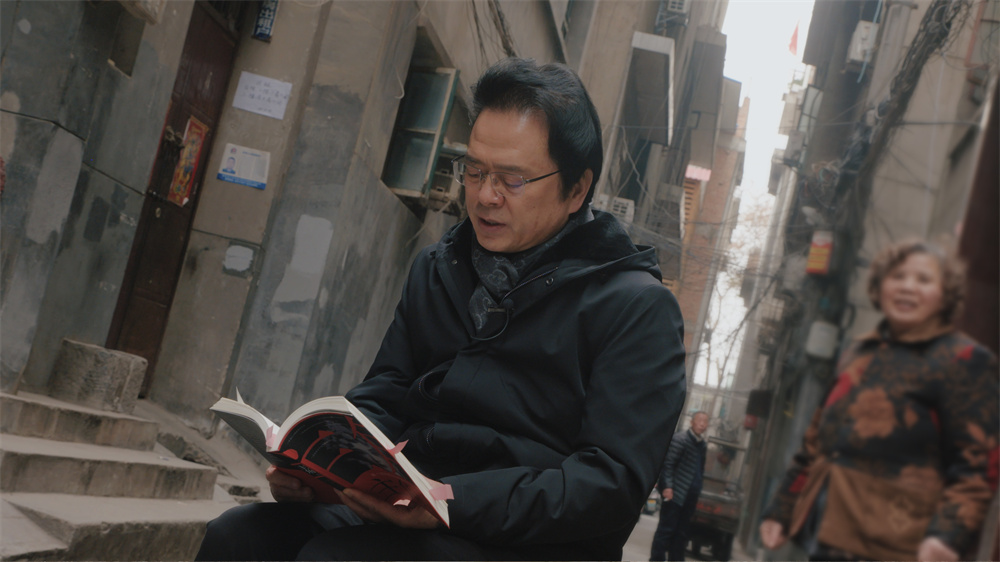
The Paper : The second season continues the narrative style of the first season, but has it made some adjustments and changes compared to the first season?
Wang Shengzhi : Compared with the first season, the second season is better and more everyday. After all, words are abstract and point-to-point, and daily life is the freeze frame of current life, so I hope to strengthen the daily nature and bring different things to the audience.
For example, Mr. Yu Jian read a text about life and death in the vegetable market, and Shuang Xuetao read his works in the billiard hall in Xiao Hutong. The people selling vegetables, meat and people passing by at the vegetable market, as well as the faces shrouded in smoke in the billiard hall are all everyday things, but the words are pointing to the meaning. Make it easy for all audiences to accept, feel that the picture is very familiar, and at the same time find that daily life is meaningful, and daily life can also extract serious issues such as people's hearts and personal destiny. Let's put it this way, images are everyday and present, but when words sound, they can fly.
On the other hand, when we shoot writers, it’s easy to think of bookstores, libraries, and study rooms. The audience may feel isolated, thinking that this is where intellectuals live, but writers are intellectuals and ordinary people, and they also go to the streets. Go to the vegetable market, go to sing and drink. I hope that literature can be better integrated with daily life, and literature does not have to be isolated, like a small enclave.
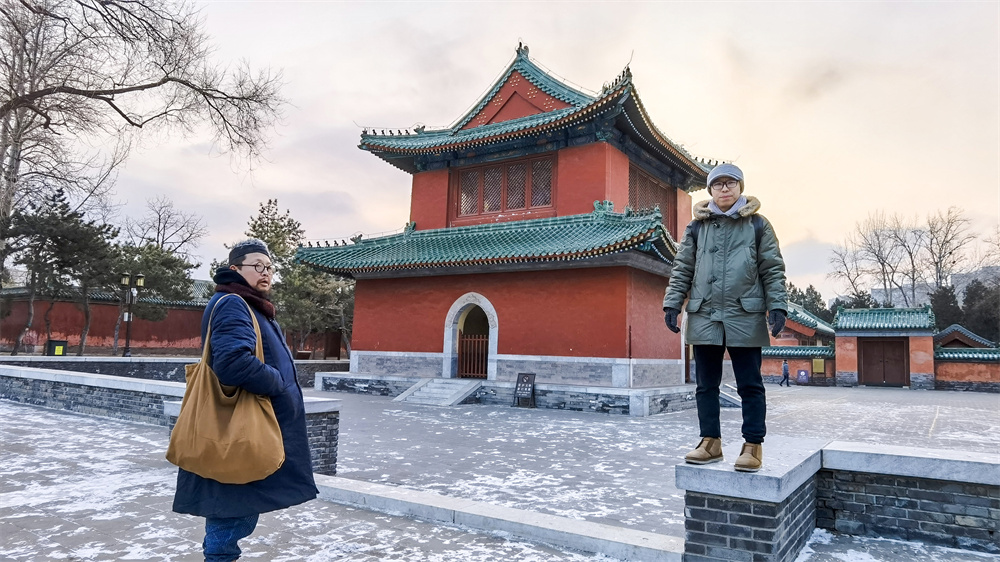

Wang Shengzhi : No one has asked me this question. I think so, "Breakfast China" also emphasizes "flying close to the ground". The owner of the breakfast restaurant works hard day after day, but there is always a good side in life, such as playing a favorite song of the bosses. I try to extract poetry from ordinary life to make people feel that the world is worth living.
So what is "Literary Everyday"? It actually uses the writer's poetic and dreaming ability to decipher the daily life. In "Daily Life of Literature", I never talk about creative matters, such as fiction and non-fiction, characterization, etc. The daily life and worldliness of the writer is what I am looking for. These two types of programs, one is to find out about flying to the sky from the ground, and the other is to go from the sky to the ground. The directions are different, but they are always thinking about how we live in this world.
The Paper : "China is So Beautiful" also has this point.
Wang Shengzhi : Yes, in fact, these works of mine are about one thing, which is the mundane life of ordinary people. Literature is related to ordinary people, rock or ballads are related to ordinary people, and breakfast is more straightforward. Whether facing writers or musicians, I want to bring them into secular life. Let me give an example. Bi Feiyu's "Tuina" wrote about a blind man named Tai Lai, who had lost his love. Bi Feiyu wrote that he has been singing all the time. He sang all popular songs from the 1980s to the 21st century. He's fine and can go to work. It can be seen that there are many things in pop songs or music that are closely related to the general public. But the worldly life is what I value.
The Paper : Frankly speaking, compared to "Breakfast China", is the audience of "Literature Everyday" smaller?
Wang Shengzhi : After the first season of "Literature Everyday" aired, I was quite optimistic. At the beginning, I really thought that no one would read it, but after the broadcast, I found that things were not so bad. There are still people in the world who love to read books, and people who care about the spiritual world, but not on the face, in every corner. I now think that people still need writers and spiritual communication, no matter where the times progress, even 6G, 7G, 8G... But fathers are still fathers, sons are still sons, and there are always some constant existences in daily life.
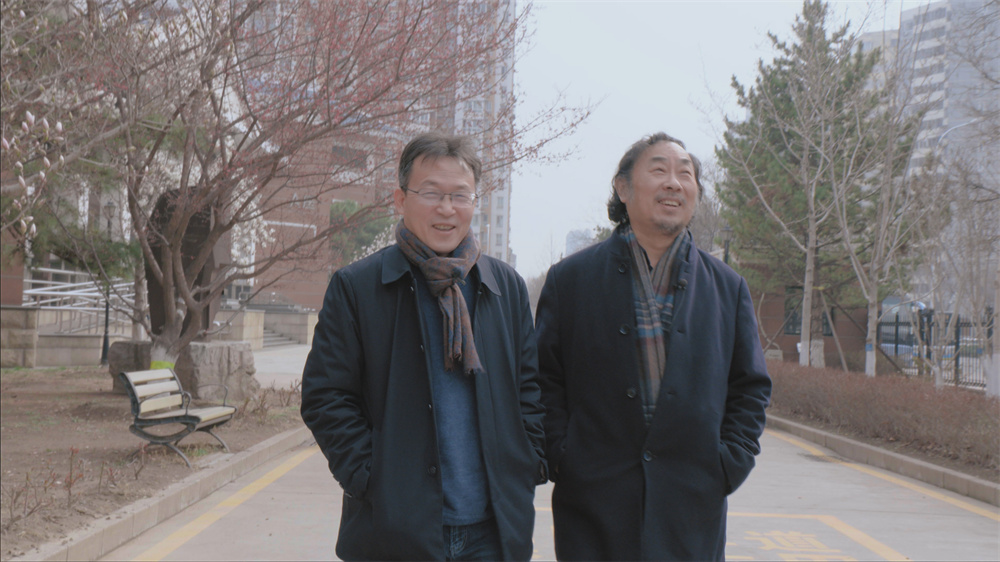
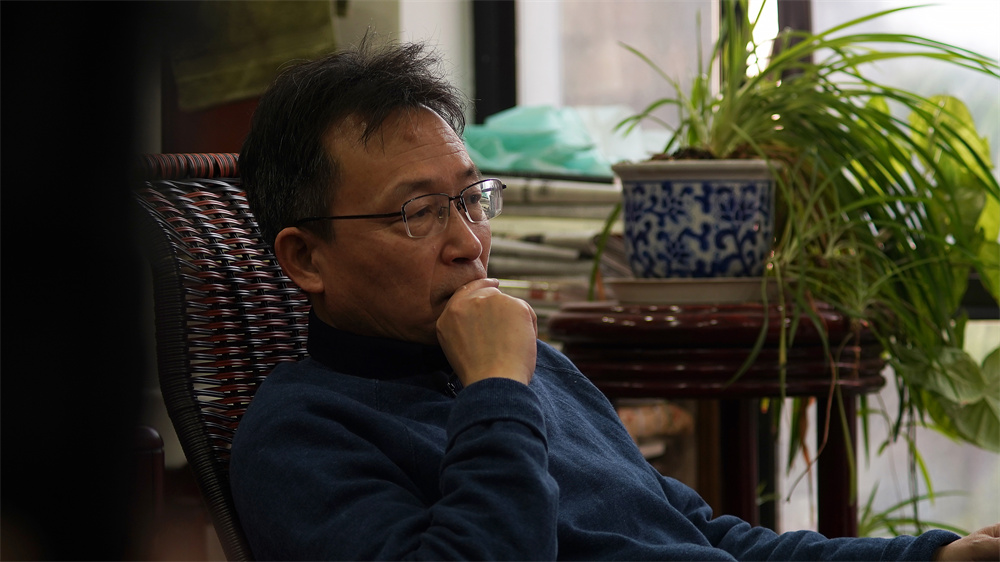
Wang Shengzhi : Yes, but first of all, I think the 1980s was obviously abnormal. At that time, a writer could become a national idol by publishing a novel, which may not be a good thing for literature. Many novels in the 1980s are hard to read now. I think it's a more normal situation now: writers do what they should do, and then influence a group of people who should be there. Whoever needs to settle down in the spiritual world, who needs to gain spiritual comfort, will naturally find it. You don't have to if everyone likes it, as long as you stick to your own creations.
The Paper : What do you think literature means to us today?
Wang Shengzhi : There is a saying in our hometown called "head in the chicken slot", which means that the chicken does not lift its head when eating, and like a printer, it eats all the chicken food in one go. In real life, we are like chickens, we must eat first, and literature may be to look up at the sky occasionally. I can only use such an imprecise analogy, look up at the sky, or float to the surface to take a breath after a long dive. Literature plays this role. When you can’t hold your breath, it is still there.


On April 21, the second season of the humanities documentary "Literature Everyday" was launched. The full-text stills are provided by the creative team of "Literature Everyday".
"I want to tell everyone that there are still some dreams in daily life, and there are some moments that take off a little." On the night of the broadcast of the first episode of the new season of "Daily Life of Literature", Wang Shengzhi, director of "Daily Life of Literature", accepted an exclusive interview with The Paper. . He said: "In the past, many people felt that literature was very far away from them. No, part of daily life is literature, and those shining and poetic existences belong to literature. Therefore, there is daily life in literature, and there is literature in daily life."
Wang Shengzhi at work (first from right)
【dialogue】The flashy and poetic existence can impress many people
The Paper : How did you come up with the idea of making the series "Daily Life of Literature"?
Wang Shengzhi : The second season of "Daily Life of Literature" has already been filmed. The filming of the first season was in 2019. At that time, I wanted to shoot this series because of my personal interests. I was born in the Chinese department, and my postgraduate studies are also modern and contemporary literature. After work, I also spend most of my leisure time reading novels. Once at a dinner party in Shanghai, Ma Jiahui told me that the relationship between writers and works is a bit like the relationship between a hen and an egg. If you feel good eating this egg, you may want to meet this hen. I think this is indeed the case. There should be a mutual mapping relationship between the work and the author himself.
I have always been interested in the group of writers, but I know that this era does not belong to writers. This era is the era of intelligence, or the era of 5G, the era of traffic, but not the era of writers. My original expectation was that no one would watch it after the filming, but then I also told myself that maybe this is also the best era for writers, because writers don’t need too much attention.
On the other hand, the group of writers has a characteristic. They are people whose main life is thinking. They soothe people through words. Other information communication, such as we brush a lot of Douyin every day, brush a lot of today's headlines, to put it bluntly, it is pushed to you by big data, it is not really communication, but people do need to communicate. So I think this group is still relevant in this day and age. So I moved to shoot a group of contemporary writers.
The Paper : Was the title "Daily Life of Literature" set from the beginning? The related name may be "writer's daily life", but the meaning is completely different, so I am also curious what ideas the name "literary daily life" carries?
Wang Shengzhi : Yes, thank you for asking this question. So many reporters have asked this question. We could easily call it "the daily life of the writer", or "the daily life of the writer", but such a name would be banal. Our daily life is originally attached to the ground, day after day. Then why add an attribute - "literary" before the daily? Because literature means the ability to dream, and it means that even if you stick to the ground, literature can lift you up from the dust and have the ability to fly a little bit. In this film, I never give the writer a biography, and I never use a long commentary to introduce what he has written and what honors he has won. I don't care about literature, not writers. I want to shoot The literary qualities in them are also called dream qualities.

The first season of "Literature Everyday" scored 8 points on Douban.

"Literature Everyday" Season 1 Douban Short Review
The Paper : What special thoughts do you have in choosing writers? The first season includes Ma Yuan, Ma Jiahui, Mai Jia, Alai, Xiaobai, and the second season includes Liu Liangcheng, Yu Jian, Li Xiuwen, Shuang Xuetao, Li Er, and Chen Yan.Wang Shengzhi : My standard is not in the Federation of Literary and Art Circles, not in literary awards, not in film and television adaptation, nor in whether it has its own traffic. In the past two seasons, my choices were entirely based on my own reading interests. The writers I choose are the ones I've seen major works over the years and who have inspired me to read and think. So after the first season came out, I watched the barrage and comments, and there were many viewers who said that he liked whoever and whoever, and whoever who was not familiar before but has become a fan since then. Human resonance. It can also be seen that some writers are not personal, and his works and ideas can touch many people.

Yu Jian (left) and Hu Liangcan

Yu Jian
The Paper : What is the process of persuading writers to be "photographed"?Wang Shengzhi : You know, the "meetings" between writers and reporters and directors are not friendly, and I have a lot of closed doors. Why is this so? Because most writers are very active, adventurous and exploratory in the spiritual world, but in the real world, he may be clumsy, shy, timid, and at a loss when facing the camera. So when encountering the media, the first reaction of many writers is to refuse.
But I am very confident that the writers under my camera are at ease, and no matter who they are, they will definitely be able to speak with their hearts and hearts. At first, Mr. Liu Liangcheng was worried that I would break his filming. He strongly demanded to see the demo before the broadcast, so I sent him the demo. He didn't respond that night, and I didn't ask. The next day, he told me to watch it again at noon. He also said that he never thought that the director of a Chinese TV station could make it like this. He said that this film is much more meaningful than many documentaries of foreign writers he has seen. Also, he said that the whole filming process was very enjoyable, and he didn't feel like he was "being interviewed." So to approach the writer, you must first become the writer's bosom friend, and even try to become the writer's colleague, so that he is not embarrassed and willing to open his heart.
Of course, it is impossible to be their peers. Each of them has been thinking and writing for many years. How could I become a writer just because I made a documentary? So let me tell you frankly, every time I shoot a writer, I feel relieved, because I did a lot of "stupid work" before the interview, and my mind was full of their works and related comments. Their reserves are all used up. But also because of these "stupid kung fu", I was able to chat about their works freely in those two days, as if I were an acquaintance. Yes, in fact, I have turned them into acquaintances in my heart, but their actions in the real camera are unfamiliar. This familiar and unfamiliar feeling inspired my questions and their answers.

Liu Liangcheng (left) and Hong Qi

Liu Liangcheng
In each encounter, the world meets unexpectedlyThe Paper : In terms of the specific shooting method, how did you come up with the entry point of "visiting friends"? Their conversations sometimes consist of two people sitting down and talking, which we are relatively familiar with, but there are also many times two people talking while walking and talking on the move.
Wang Shengzhi : The two core elements of this film are here, one is "friends" and the other is "roaming". I wrote a sentence for them in the promotional video, saying, "The loneliest people often have the most persistent friends." The daily life of most writers is daze, thinking, and reading. They are often a person who walks alone in the spiritual back garden, but such people often have very persistent friends. As long as you find the right friends, they can mirror each other. Congruent sound. For example, many poems written by Wang Wei are for Pei Di. When a writer encounters a bosom friend and a real friend, he will talk endlessly. If you swap this friend for a TV host, chances are you'll end up being silent.
You pointed out another very important thing, which is roaming. Most writers were afraid of trouble at first, and they said that they should either shoot at home or in the study, but I was very insistent on this point, and I said to go out. This kind of roaming is particularly obvious in the second season. For example, Li Xiuwen and Han Songluo drove all the way from Lanzhou to Dunhuang. What is the core of this roaming? is an encounter. As long as you go out, you will encounter unexpected encounters, which is completely beyond the part of the so-called "planning case". After arriving in Dunhuang, we went to a village and met an uncle who was planting an elm tree at the entrance of the village. They asked the uncle what the elm money was used for, and then entered the uncle's yard smoothly. The uncle also greeted them to sit down and drink tea and told them about his past. Li Xiuwen later read a paragraph in "Mountains and Rivers Cassette" in that place: "In an instant, I felt inexplicable, and I had to thank you again for writing, Gratitude and writing will definitely run through my life, just because the rice waves in front of me and the hard work in the rice waves are exactly the two gods I want to worship for the rest of my life: the people and the beauty."
I want to say that this encounter is really unplanned, because roaming is both a movement of physical space and a spiritual journey of friends. They would talk deeper and deeper, with a lot of impromptu popping up. Encounters and improvisations are very real things, which are the core of my film, and what makes it different from "Hometown of Literature", "They Write on the Island", "The Moon in Hand", my film It's all about encounter and improvisation.
I remember when I was filming A Lai last season, one of his requirements was "I don't act." He said that many people asked him to make a film and asked him to act, from left to right, shaking hands and hugging whoever. He said that if he wanted to act, he wouldn't do it. My films seek extreme realism in wandering. But this is really unfriendly to the director, because you don't know when an encounter will appear, you have to catch it in time, zoom in on it, and go deep into it, and you can't do it again. In that scene, if you're blind, it's gone in a blink of an eye.
The Paper : There seems to be a geospatial issue here - where does the writer choose to live? Where does he go every day? Where does he want to take his friends? ... A writer's understanding of life, of literature, is often inseparable from these geographic spaces.
Wang Shengzhi : Yes, a writer's creation usually has a lot to do with his choice of place. Think about Bai Juyi or Su Dongpo. They built a house every time they went to a place they liked, planted flowers in the front and back, and then wandered in their spiritual world. If there was no such geographical or material base, how could there be a spiritual base? The base of one's creation is first and foremost in the sense of geospatial.

Li Xiuwen (left) and Han Songluo

Li Xiuwen
The Paper : Do different writers have different focuses?Wang Shengzhi : Every writer is a different individual, but I would like to talk to you about one thing they have in common, that is, they look mature and mature on the surface, but they are very naive and childish in their hearts, and they are full of curiosity about the world. Children who grew up in our rural areas say that the elderly live as "old children".
The Paper : As far as you are concerned, what are the unforgettable scenes during the shooting?
Wang Shengzhi : I remember Mr. Liu Liangcheng would squat down to talk to the lizards, and guess from the broken wine bottle that a herdsman’s night was howling with the west wind; Mr. Yu Jian was more like a child, he walked into an ancient courtyard and called me to go He looked at a door with a broken corner, and asked me if I knew how the corner came from. I said no, and he said seriously that the house belonged to the Song Dynasty. The husband and his wife quarreled, and the wife slammed the door and left. , the door broke in a corner. I was dumbfounded and thought, isn't this what a child said? And last season's Mr. Mai Jia, it was raining that day, he was not upset at all, he told me that if there was no rain, no moonlight, there would be no poet, and he also said: "If it doesn't rain, I can't fall in love, the sun keeps coming out. What about love?" It's very interesting, and I think it's wonderful to be able to record the innocence of these writers with video.
Besides Shuang Xuetao, the youngest writer in two seasons. At that time, when he and Shi Hang were walking in the alley, they entered a family. This family did not reject the camera, so we asked for a cup of tea. Unexpectedly, this family was laid off in the 1990s. He told Shuang Xuetao that I was a laid-off worker with no skills, unlike you as a writer. Shuang Xuetao immediately said seriously, my parents are all laid off. I was quite shocked at that moment. Then I asked him which book or which writer had the most influence before he became a writer, do you know what he said to me? He said his literary career began with The Reader.
Teacher Chen Yan returned to the home where he wrote a prototype in his first novel, The Story of Xijing. That person lives in an urban village in Xi'an. The bedroom is connected to the kitchen, and the total area is less than ten square meters. As a result, after Mr. Chen Yan went in, he was like a duck to water, sitting there and chatting with him. At that moment, you will find that sympathy and empathy do not mean that I understand you or that I pity you. There is still a difference in treatment, true sympathy or empathy. The heart is "I am you".

Chen Yan (right) and Chen Xiaoduo

Chen Yan
When people can't hold their breath, literature is still thereThe Paper : The second season continues the narrative style of the first season, but has it made some adjustments and changes compared to the first season?
Wang Shengzhi : Compared with the first season, the second season is better and more everyday. After all, words are abstract and point-to-point, and daily life is the freeze frame of current life, so I hope to strengthen the daily nature and bring different things to the audience.
For example, Mr. Yu Jian read a text about life and death in the vegetable market, and Shuang Xuetao read his works in the billiard hall in Xiao Hutong. The people selling vegetables, meat and people passing by at the vegetable market, as well as the faces shrouded in smoke in the billiard hall are all everyday things, but the words are pointing to the meaning. Make it easy for all audiences to accept, feel that the picture is very familiar, and at the same time find that daily life is meaningful, and daily life can also extract serious issues such as people's hearts and personal destiny. Let's put it this way, images are everyday and present, but when words sound, they can fly.
On the other hand, when we shoot writers, it’s easy to think of bookstores, libraries, and study rooms. The audience may feel isolated, thinking that this is where intellectuals live, but writers are intellectuals and ordinary people, and they also go to the streets. Go to the vegetable market, go to sing and drink. I hope that literature can be better integrated with daily life, and literature does not have to be isolated, like a small enclave.

Shuang Xuetao (right) and Shi Hang

Shuang Xuetao
The Paper : Before, more audiences were familiar with you because of life documentaries like "Breakfast China". What are the differences between shooting breakfast and food, and shooting writers and literature? What are the similarities?Wang Shengzhi : No one has asked me this question. I think so, "Breakfast China" also emphasizes "flying close to the ground". The owner of the breakfast restaurant works hard day after day, but there is always a good side in life, such as playing a favorite song of the bosses. I try to extract poetry from ordinary life to make people feel that the world is worth living.
So what is "Literary Everyday"? It actually uses the writer's poetic and dreaming ability to decipher the daily life. In "Daily Life of Literature", I never talk about creative matters, such as fiction and non-fiction, characterization, etc. The daily life and worldliness of the writer is what I am looking for. These two types of programs, one is to find out about flying to the sky from the ground, and the other is to go from the sky to the ground. The directions are different, but they are always thinking about how we live in this world.
The Paper : "China is So Beautiful" also has this point.
Wang Shengzhi : Yes, in fact, these works of mine are about one thing, which is the mundane life of ordinary people. Literature is related to ordinary people, rock or ballads are related to ordinary people, and breakfast is more straightforward. Whether facing writers or musicians, I want to bring them into secular life. Let me give an example. Bi Feiyu's "Tuina" wrote about a blind man named Tai Lai, who had lost his love. Bi Feiyu wrote that he has been singing all the time. He sang all popular songs from the 1980s to the 21st century. He's fine and can go to work. It can be seen that there are many things in pop songs or music that are closely related to the general public. But the worldly life is what I value.
The Paper : Frankly speaking, compared to "Breakfast China", is the audience of "Literature Everyday" smaller?
Wang Shengzhi : After the first season of "Literature Everyday" aired, I was quite optimistic. At the beginning, I really thought that no one would read it, but after the broadcast, I found that things were not so bad. There are still people in the world who love to read books, and people who care about the spiritual world, but not on the face, in every corner. I now think that people still need writers and spiritual communication, no matter where the times progress, even 6G, 7G, 8G... But fathers are still fathers, sons are still sons, and there are always some constant existences in daily life.

Li Er (left) and Zhang Qinghua

Li Er
The Paper : You are from a Chinese department and have witnessed the changes in Chinese literature from the 1980s to the present. In your observation, does the social position of literature have a process from mainstream to marginal? How do you feel about this process?Wang Shengzhi : Yes, but first of all, I think the 1980s was obviously abnormal. At that time, a writer could become a national idol by publishing a novel, which may not be a good thing for literature. Many novels in the 1980s are hard to read now. I think it's a more normal situation now: writers do what they should do, and then influence a group of people who should be there. Whoever needs to settle down in the spiritual world, who needs to gain spiritual comfort, will naturally find it. You don't have to if everyone likes it, as long as you stick to your own creations.
The Paper : What do you think literature means to us today?
Wang Shengzhi : There is a saying in our hometown called "head in the chicken slot", which means that the chicken does not lift its head when eating, and like a printer, it eats all the chicken food in one go. In real life, we are like chickens, we must eat first, and literature may be to look up at the sky occasionally. I can only use such an imprecise analogy, look up at the sky, or float to the surface to take a breath after a long dive. Literature plays this role. When you can’t hold your breath, it is still there.

"Literature Everyday" Season 2 Poster
Related Posts